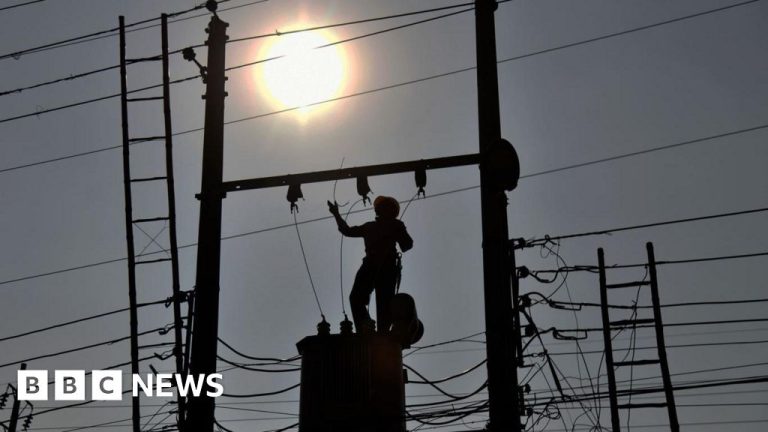Bangladesh is accelerating its payments to Adani Power after the Indian conglomerate reportedly halved its electricity supplies due to an unpaid $800 million bill.
Two senior government officials told the BBC they were already in the process of making partial payments to Adani, which supplies 10% of the electricity used by Bangladesh.
“We have resolved payment issues and have already issued a letter of credit of $170 million (£143 million) to the Adani Group,” a senior official at the Bangladesh Power Development Board told the BBC.
Adani supplies Bangladesh from its 1,600 megawatt coal-fired power plant in eastern India. The company did not respond to questions from the BBC about cuts to its supply to Bangladesh, which regularly suffers electricity shortages.
The company reportedly threatened to suspend all supplies if the money owed to it was not settled by November 7. But the head of the Bangladesh Power Development Board said he “did not believe that it would not reach a stage where full supply would be interrupted.”
Bangladesh officials told the BBC they would make the payments gradually and steadily and were confident they could resolve the payments crisis.
“We are shocked and surprised that despite increased payments, supplies have been reduced. We are ready to repay and will make other arrangements, but we will not let any power producer take us hostage and blackmail us,” said Fouzul Kabir Khan, energy advisor to the caretaker government.
Bangladesh increased its repayments from $35 million in July to $68 million in September and $97 million in October, he said.
The country is already suffering from growing electricity shortages in rural areas.
Bangladesh struggles to generate dollar revenue to finance expensive essential imports like electricity, coal and oil. Foreign currency reserves fell during months of student protests and political unrest that toppled Sheikh Hasina's government in August.
The interim government that replaced her requested an additional $3 billion loan from the International Monetary Fund (IMF), on top of its existing $4.7 billion bailout package.
Adani's power deal with Bangladesh, signed in 2015, was one of several agreements under Sheikh Hasina that the current caretaker government has described as opaque. A national committee is re-evaluating 11 previous deals, including one with Adani, which has often been criticized as costly.
Besides Adani Power, other Indian state-owned companies also sell electricity to Bangladesh, including NTPC Ltd and PTC India Ltd. Power Development Board officials confirmed that partial payments of money owed to other Indian power suppliers were also being made.
Bangladesh is restarting some gas and oil-fired power plants to plug the supply gap, although experts say this will increase the cost of electricity. As winter approaches, electricity demand on the grid is expected to decrease as air conditioners are turned off.
“Other coal-fired power plants are operating at 50% capacity and the country is unable to buy enough coal due to the dollar crisis. It is therefore important to continue supplying plug-and-play electricity from Adani. It is slightly more expensive than local producers, but it is a crucial supply,” said Dr Ajaj Hossain, an energy expert and retired professor.
Bangladesh plans to commission its first nuclear power plant in December to diversify its energy mix. Built with Russian assistance, it cost $12.65 billion, financed mainly by long-term Russian loans.

